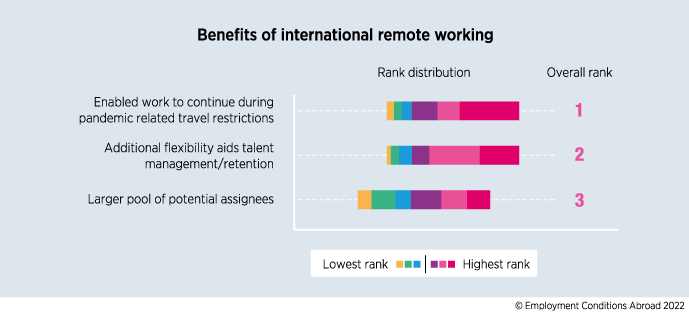The topic of remote working continues at pace with news from the Netherlands where the parliament recently approved legislation to make working from home a legal right for employees. While the legislation is still pending approval by the Dutch Senate, it poses the question: will other countries be likely to follow their lead?
Meanwhile a divide broadens between employers who clearly embrace the remote working model and those who do not. In April, the news that Airbnb introduced a new remote working policy for its employees was met with much interest and publicity. Comparisons were quickly made with other tech firms, notably Tesla and Google who appeared to go in the opposite direction, requiring their employees to return to the office.
Time will tell whether these decisions and the policies supporting them prove to be wise and sustainable moves, but one thing appears to be certain, with the Great Resignation and global talent shortages, businesses will need to think hard about how they can attract and keep hold of their talent.
At our Global Mobility Exchanges - a series of virtual online discussion sessions we recently hosted - we explored some of these key themes and considered how the strategy ‘Build Back Better’ has given rise to new expectations from employees concerning international remote working and hybrid working processes. For global mobility teams, there has been a significant rise in the number of employees seeking to work from anywhere brought about by the pandemic – with 80% of companies participating in our Global Mobility Now Survey now looking to formalise terms and conditions to permit some form of international remote working, and numbers anticipated to increase further over the next two years. During the GM Exchanges, a number of companies discussed how they were having to quickly introduce policies for virtual assignments, where an employee remains in their home country without the need to physically relocate to the host country, and also for employees wanting to work abroad temporarily. While virtual assignments were seen by some companies as an opportunity to broaden their international talent pool, there was some debate on whether the second category might be outside the remit of global mobility teams and to whom relevant decisions and responsibility should fall.
One of the positives of virtual assignments is that, where structured correctly, they can enable accessibility to more opportunities for the overall workforce. As one contributor remarked, “Anyone can do this!” These types of global assignments mean the opportunities are potentially open for everyone. In our Global Mobility Now Survey, the findings support this with the top three benefits as shown below:

Going forward, virtual assignments could offer primary care givers and those with physical disabilities an opportunity to develop their business skills while remaining in the home country but performing tasks and being responsible for operations in another country.
While companies like Airbnb may grab headlines with their working remotely from anywhere, allowing employees free rein to choose where they work could entail a number of serious compliance risks.
This latter point was echoed by companies attending the GM Exchanges, who were quick to highlight some of the challenging aspects of employees seeking to work temporarily from another country, such as the risk of creating a permanent establishment in a country where the employee may be physically working, together with personal income tax and social security obligations and also payroll withholding considerations. Companies also voiced negative sides to “working from anywhere”, noting how time zone differences can put a strain on people due to early and late video meetings and calls. There is a “loss of respect for time differences”, according to one international employer, as flexibility is taken to another level when working remotely.
The need for GM teams to adopt some flexibility into their practices is more important now than ever, and while it is crucial to adopt a pragmatic approach to employee requests on remote work and virtual assignments, we cannot stick our heads in the sand and hope that the topic of remote working will go away.
ECA’s Global Mobility and Covid-19 Survey reported that over half of companies (51%) had yet to update their mobility policy as a result of the pandemic. Post pandemic, global mobility teams are well placed to drive this change and lead internal discussions on international remote working and the future of virtual assignments; and this could well be a critical step in keeping hold of your broader pool of talent and future assignee population.
Here at ECA we can help you get started with this.
FIND OUT MORE
Get in touch with our Consultancy & Advisory team if you would like help reviewing your global mobility policies to cater for virtual assignments, or with identifying high-level compliance and legal risks of working from anywhere arrangements.
Our Consultants also work with clients to assess and update assignment letters and contracts, and provide recommendations on digital solutions for reporting, tracking, payroll and compliance through our partners Tracker Software Technologies (TST), Global Expat Pay and Deel.
Don’t hesitate to give us a call if you’d like any such support, or request a call-back and one of the team will be in touch.
Please contact us to speak to a member of our team directly.